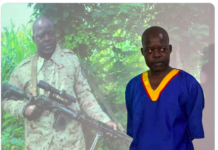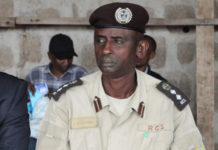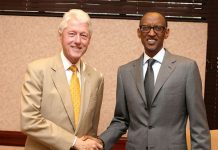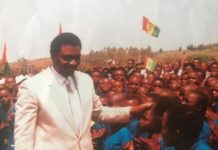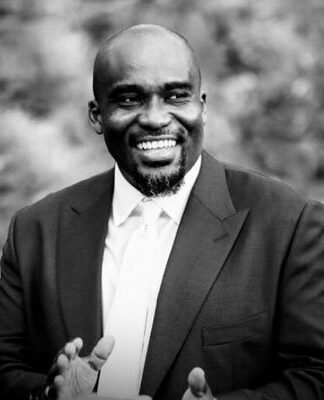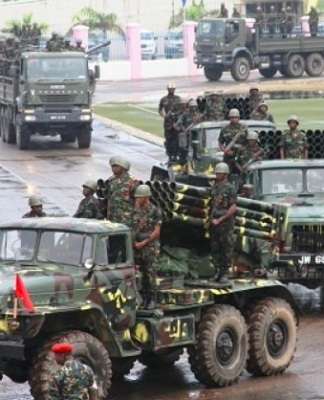Adopted from Healing A Nation: A Testimony by Dr. Theogene Rudasingwa
(Available on Amazon.com)
CHAPTER FORTY THREE
The Real Paul Kagame
A RECAP
Rwanda has had two violent revolutions so far, but dictatorship in Rwanda remains an enduring affliction that still haunts her people. Rwanda seems to be stuck in a situation reminiscent of pre-1959 or pre-1990 period. The pre-1959 saw the rise of a marginalized Hutu population led by elite that challenged the monarchist status quo. The birth of the Rwandan Republic, and the end of the Belgian colonialism, was a violent phenomenon. While bringing social, economic and political benefits to the previously marginalized Hutu community, the 1959 revolution ended up marginalizing the Tutsi community. Many Tutsi were massacred, and hundreds of thousands fled into exile. The revolution produced Tutsi refugees, followed by waves of insurgency (INYENZI) that ended in the 1960s. Within Rwanda, the short lived multiparty politics abruptly came to an end, as the political space was closed and the country became a one-party state, under MDR PARMEHUTU party. Power also became over-centralized in the hands of President Gregoire Kayibanda, who with time, relied more and more on people from his community in Gitarama, in southern Rwanda.
In 1973, there was a palace coup within the revolution, and General Juvenal Habyarimana, a Hutu from the north, came to power, subsequently forming his own party, MRND. Many politicians from the south died at the hands of the new regime. President Habyarimana injected new energy into what had become a moribund system under MDR-PARMEHUTU and was seen to be “soft” on Tutsi, but the regime remained a Hutu one, and increasingly biased in favor of the north. Rwanda was still a one-party state. Like the previous monarchy before 1959, and Kayibanda’s regime till 1973, power became over-centralized in the hands of President Habyarimana. Tutsi remained in exile, and marginalized within the country. Towards the end of the 1980s and beginning with 1990, the MRND regime had lost momentum and was under attack internally from political parties (mainly of Hutu from the south) and from an invasion by Tutsi refugees (RPF) from Uganda. Under political, economic, military and diplomatic pressure, President Habyarimana reluctantly negotiated the Arusha Peace Agreement with RPF. The peace agreement provided a vision for democratization and the rule of law, power sharing among MRND, RPF and other opposition political parties, establishment of new security institutions ( Army and Gendarmerie), and the return of the 1959 refugees. For a brief moment Rwandans were hopeful that peace, reconciliation, democracy and the rule of law were coming to Rwanda at last.
Then General Kagame struck, killing President Habyarimana, triggered genocide, and finally captured power, ending the Arusha Peace Agreement. In his ambition to get power by any means, General Kagame triggered a genocide in which 800, 000 Tutsi perished at the hands of the so called Provisional Government, its security institutions, and the interahamwe militia. Hundreds of thousands of Hutu have died in Rwanda, and the Democratic Republic of Congo, at the hands of President Kagame’s RPA, in war crimes, crimes against humanity and even, possibly, acts of genocide, according to a UN Mapping report.
Rwanda’s history seems to repeat itself more often than elsewhere in space and time. President Kagame’s dictatorship far surpasses the previous ones. RPF’s revolution of the 1990s has become frozen, and in its wake President Kagame has gradually turned RPF and its sister, RPA (now RDF), into tools for his absolute dictatorship. What could have become a national revolution has become a” Tutsi revolution”, a misnomer because like previous revolutions, the ordinary Hutu and Tutsi gradually become tools of the ruling elite (Hutu or Tutsi) at the top. Rwanda has refugees. Political space is completely closed, and Rwanda, as before, has become a one-party highly militarized and secretive state. Political opponents, journalists, and human rights activists are harassed, imprisoned, killed, or forced to flee the country.
Even in exile, critics of the regime have no solace. The imprisonment of Victoire Ingabire of FDU-Inkingi, Bernard Ntaganda of PS Imberakuri, Deo Mushaidi of PDP-Imanzi and many others is testimony to the prevailing mood in Rwanda. The assassinations of Seth Sendashonga, Theoneste Lizinde, Rwisereka of the Green Party in 2010,.Rugambage, Charles Ingabire in Kampala, 2011, the assassination attempt of General Kayumba Nyamwasa in 2010 in South Africa, the various assassination schemes that have been foiled in the United Kingdom, Sweden and other places, are some of the testimonies to the criminal nature of the regime. There is no independent media in Rwanda. The judiciary and legislature in Rwanda are not independent. Their powers have been usurped by President Kagame. Civil society and the private sector are controlled by President Kagame’s small band of Tutsi military officers and a few RPF civilians allowed into the circle of the First family.
How have President Kagame and his family come to dominate Rwandan society to levels previously not seen in Rwanda’s recent history? How does his system work? How has his character, shaped by being a refugee at a tender age, his involvement in violent wars in Uganda, Rwanda and DRC affected his outlook on life?
Since the 1980s, Paul Kagame has been at the center of violent conflicts spanning the territories of Uganda, Rwanda and the Democratic Republic of Congo. In these conflicts, there has been widespread destruction of life and other horrendous human rights abuses. Kagame bears personal as well as command responsibility for some of these crimes, including assassinations and other serious human rights abuses.
After a lifetime of unimaginable violence, Kagame is like a serial killer, a person with no regrets or remorse for the acts of violence that he or others acting on his instructions commit. He is not apologetic about this. On the contrary, he makes it a point in public and private conversations that indeed his opponents must die. Probably a result of his past crimes, President Kagame is very paranoid about plots to remove him from power and about his security in general. Since coming to power, Kagame has amassed a vast fortune. This fortune has been acquired by unethical and sometimes, criminal means.
Kagame’s actions are influenced in large measure by a reckoning with his past. Kagame believes that a person’s name or reputation is his or her most precious possession. He has established a false reputation of frugality, incorruptibility, accountability in government, and military hero who stopped the genocide. Preserving this false image is critical to the preservation of Kagame’s monopoly of power in Rwanda.
Kagame’s greatest concern is that of the people who have information (including corruption and responsibility for assassinations, war crimes and crimes against humanity, in Uganda, Rwanda and the DRC which may tarnish the public image that he has crafted. Kagame’s criminal background, and the need to avoid being held accountable, explains why he is bent on staying in power at all costs, including the assassination of political opponents.
THE ANATOMY OF A DICTATORSHIP
First Family: President Kagame stands at the top of the social, economic, political and military pyramid in Rwanda. Second in command is his wife, Jeannette Kagame, who wields a lot of influence over her husband. She has influence on who falls or rises within the political system; appointments of Ambassadors, Cabinet Ministers, and other high level offices; places her own people in some strategic positions; and has influence on security services through General Jack Nziza. Mrs. Kagame has come to be the most influential in the HIV/AIDS/TB/Malaria health sector programs, where most aid money is. According to U.S. Government sources, from 2004-2009, Rwanda received over $ 540 million from U.S PEPFAR. In fiscal year 2011 alone, Rwanda received almost U.S. $ 132 million from U.S. PEPFAR. Since 2003, Rwanda has received a total disbursement of over U.S. $ 570 million from the Global Fund. With this in mind, the First Family has successively moved Dr. Agnes Binagwaho, the First Family Pediatrician, to manage these resources on their behalf. Prior to the Binagwaho’s appointment as Minister of Health, the First Family appointed Caroline Kayonga, wife of Lt. General Charles Kayonga as Permanent Secretary of the same Ministry.
The Core: The third layer in Rwanda’s power pyramid after the President and his wife, are a core of high ranking military officers who formerly worked as President Kagame’s bodyguards during the civil war; intelligence and close protection personnel of the elite Republican Guard; and the entire Republican Guard itself. This inner circle includes Lt. General Kabarebe Minister of Defense; Lt. General Charles Kayonga, Chief of the Defense Forces; Col. Dr. Emmanuel Ndahiro, who was his personal doctor, and until recently, the head of the National Security Services; and Brigadier General Jack Nziza (not a former bodyguard, but has had a long relationship with President Kagame from the Uganda days, manages the informal security system, and is very close to Jeannette Kagame). This core group (directly or indirectly) run the elite and privileged Presidential Guard which protects the family, and exercise official and unofficial oversight over the Rwanda Defense Forces (RDF), the Reserve Force, and the Local Defense Units.
This core group of exclusively Tutsi officers also keeps an eye on other organs of the government, civilian (including the Legislature and Government Ministries) as well as military, to ensure that these organs and the people running them serve the interests of President Kagame and his regime. These senior officers also supervise the intelligence and close protection officers of the Republican Guard, who over the years have included Col. Tom Byabagamba, Col. Silas Udahemuka, Lt. Col Hodari (Commanding Officer, Republican Guard; and the powerful Lt. Col. Willy Rwagasana, President Kagame’s Chief Escort. Kagame’s former military escorts during the civil war, together with the current young military escorts, run the entire security apparatus. Although the fortunes of the individual members of this inner core rise and fall with time, the groups as a whole are the most stable of the various groups that constitute the leadership of Rwanda. They are indispensable to Paul Kagame. Kagame depends on them for his protection and for his political survival. As the most trusted assistants, some of them have access to information whose disclosure would be politically damaging to Paul Kagame. In turn this core group is hostage to him, since he has used them in criminal activities, and they cannot afford to be outside his sphere of influence.
Republican Guard: The elite 3,000 strong plus Republican Guard has the exclusive mission to protect the First Family. It is a privileged unit, with financial, material, training and equipment incentives that are over and above those of the rest of the armed forces. Members of this unit are groomed to take over command of battalions and divisions of the Regular Army. Kagame puts members of this Unit in control of Battalions and Division command positions.
The members of this Unit are almost all exclusively Tutsi.
Informal Security Networks: President Kagame has established informal security networks that work parallel to or in competition with security organs established by law. The primary objective of the informal networks is to identify and neutralize real and imagined enemies of the regime. The informal security networks are the President’s enforcers. Many members of these informal networks are deployed in foreign countries, including embassies of Rwanda in countries where there are significant populations of Rwandan refugees. These informal networks are only accountable to the President, and in some cases, to his wife. The most prominent of these informal security networks are the ones operated by Brig General Jack Nziza. Kagame can always count on him to essentially constitute a powerful informal government that runs the formal government. In view of the unwavering determination and exceptional brutality that General Nziza has always demonstrated, and continues to demonstrate, in eliminating what he calls the enemies of the regime, he has acquired a special relationship with President Kagame and Jeannette Kagame that even other members of the inner core group no longer enjoy. General Jack Nziza is arguably now more influential with Paul Kagame than most of the members of the core group. General Jack Nziza meddles in the work of all institutions in Rwanda, including the legislature and the judiciary. He tries to impose his oversight over all institutions on the pretext of being after enemies or saboteurs of the regime. He usually gets his way, because of the ruthless reputation that he has acquired.
The Intelligence Services: The fifth layer of control is the Intelligence services, namely the National Security Service and the Directorate of Military Intelligence. Note that the intelligence services of the Republican Guard, and Kagame’s informal networks, are superior, and ultimately control, these other intelligence services. The notable figure in these intelligence services is Lt. General Karenzi Karake ( KK), brilliant, but passionately hated by President Kagame for long, and who was humiliated before he was given the task to head the National Security Service.
Rwanda Defense Forces: The sixth layer of control is the military. The military are the backbone of the Rwanda government. President Kagame discusses major policies and decisions with senior military commanders before discussing them with civilian assistants. The military commanders are the real government; the civilians in government are the technocratic servants of the military. The Rwanda Defense Forces are, in essence, not a national army. They owe allegiance not to the state, or its people, but to one political organization, the Rwandese Patriotic Front, and to its supreme leader, President Kagame. No wonder he calls RDF, “my army”, and its officers, “my officers”.
The RDF is spread throughout the country. They perform many political functions on behalf of the RPF. The military are responsible for mobilization for the party: convincing opinion leaders to join and serve the RPF. Military officers are responsible for the supervision of the local government officials that the RPF appoints, the RDF is responsible for the rigging of elections in favor of the RPF, and military officers are responsible for ensuring that opponents of the regime everywhere are identified and destroyed.
The Rwandese Patriotic Front: The seventh layer of control is RPF. The Rwandese Patriotic Front is unofficially the sole party that is allowed to practice politics in Rwanda. The party is President’s Kagame’s tool for controlling every aspect of life in Rwanda. The party controls the country through the officials that it appoints to public office at all levels. Its members constitute the overwhelming majority of all institutions. The party maintains strict control of all these officials by requiring them to take an oath and through disciplinary procedures that are a violation of the laws that require certain public officials to be independent.
The party secretariat functions as a parallel office of the Prime Minister. The RPF Secretariat is responsible for the appointment of all civilian public officials, including ministers, judges, and legislators; draws recommendations for Kagame to approve, if he has made his decision before hand; responsible for discussing and approving all policy development, including all policy proposals and major decisions to be discussed by Parliament; disciplining all civilian public officials who are members of the party, including ministers, judges, and legislators, who by law should be independent. Currently, RPF civilians like James Musoni and Aloysea Inyumba (before she passed away) wield a lot of influence due to the special relationship they have with President Kagame. The party is a vast network of informal government mechanisms that operate at all levels of the organization of state administration.
Financial Managers: The eighth layer of control are the people who run President Kagame’s financial interests. President Kagame has a three-pronged strategy for sustaining his control of power in Rwanda:
(a) Establishing intelligence systems that are able to identify and neutralize all real or perceived threats
(b) Maintaining a strong military that is able both to protect the regime and to project his power abroad
(c) Securing the resources to finance the activities of the military and security institutions that keep him in power.
For these resources, President Kagame draws both on public resources and the business activities of the RPF. The men and women who are responsible for generating, managing and delivering these resources are very influential. In government, the following people have been responsible for making sure that President Kagame can get access the government finances for personal and non-official purposes:
– Don Kaberuka, Former Minister of Finance, now President of the African Development Bank
– Manasseh Nshuti, Former Minister of Finance
– John Rwangombwa, and Governor of Central Bank
– Ms. Sayinzoga, Permanent Secretary, Ministry of Finance (Wife of Kagame’s nephew).
– Jack Nziza, Permanent Secretary, Ministry of Defense.
– Claver Gatete, Minister of Finance
The business enterprises that President Kagame owns ostensibly belong to the RPF and the Defense Department, but are practically his personal businesses. He alone controls this business empire. The RPF has no treasurer or finance committee. The accounts of the businesses are secret and never audited independently. The managers of the businesses are answerable to Kagame alone. Kagame does not account to any organ of the RPF on these business and finance matters.
The holding company for the businesses run by civilians is Crystal Ventures Limited (CVL), a successor to former Tri-Star Investments, supposedly an RPF company. In fact this is a Paul Kagame’s company. President Kagame’s financial empire includes the following: Rwanda Investment Group (RIG), involved in a wide range of activities; Telecommunications (MTN Rwandacell and Altel); Banking; Construction and building products (NDP-COTRACO S.A.R.L); Real estate development ((Real Contractors, Bond Trading S.A.R.L); Catering (Bourbon Coffee), Security services (Intersec Security); Packaging (Design Packages); Beverage and food processing (Inyange Products); Communications (GPS Graphic Print Solutions); and Whole sale and Retail Trading, (Mutara Enterprises).
President Kagame also carries on business using institutions under the Ministry of Defense. The vehicle for this branch of his business empire is the Horizon Group, which was set up in 2008 by the Ministry of Defense. The subsidiaries of the Horizon Group include: a commercial bank ( ZIGAMA-CSS); large infrastructure projects (Horizon Construction); agricultural products (Horizon SOPYRWA); and Horizon Logistics, providing logistical support to over 3,500 Rwandan troops under the United Nations Mission in Darfur (UNAMID) and the United Nations Mission in Khartoum, Sudan (UNAMIS). Horizon Logistics is also involved in export and import clearing and forwarding services. This suggests that economic and political interests of the holding do overlap as the earnings from one subsidiary company subsidize the operations of the other. By forming joint ventures with state owned enterprises, RPF and Military companies ( directly under the control of President Kagame) receive free funding, and transfer any risks to the state should the ventures fail, which is often.
Formal Government: The ninth layer of influence and control is the formal Government institutions, situated very far down the ladder in the power structure of Rwanda. Hutu who are accommodated by the system are mainly found in the formal government. Members of the formal government are merely technocrats implementing the policies of others and are not influential unless they happen to have strong connections in the party or with the President. However, it should be noted that many of the people who will strong influence by virtue of their positions in informal structures also have official positions.
In fact, the RPF ensures that the most important government departments are entrusted to very trusted members. The institutions that are most critical to President Kagame’s strategies for controlling the state are the following, and, like the security institutions, are all controlled by Tutsi ( or presumed to be):
– Central Bank: John Rwangombwa, Governor
– Ministry of Finance: Minister, Claver Gatete
– Ministry of Health: Minister, Dr. Agnes Binagwaho
– Rwanda Revenue Authority: Ben Kagarama
– Ministry of Justice: Tharcisse Karugarama
– Office of the Prosecutor General: Prosecutor General: Martin Ngoga
Kagame’s Foreign Legion: The tenth layer of influence is exercised through an elaborate network of foreigners ( and a few Rwandans) who have to sell President Kagame’s image and narrative as the sole hero and savior of Rwanda. Because Rwanda is heavily dependent on aid, and his reputation as the western-celebrated leader of the “emerging Singapore of Africa” is crucial to the continuous flow of aid, this group of people is crucial in facilitating him. Through what he calls the Presidential Advisory Council (PAC), he is able to promote a soft and deceptive image abroad, especially where it matters most, in the United States and the United Kingdom. Through lobbying, public relations, and access to the media, these facilitators help President Kagame’s self-promotion abroad, and shield him from accountability for the crimes he commits on Rwanda, DRC and abroad. The loudest mouthpiece in the whole group is Tony Blair. President Kagame’s staunchest defender at the United Nations is U.S. Ambassador Susan Rice.
This foreign legion includes the following:
– Tony Blair, former Prime Minister of the United Kingdom
– Bill Clinton, former President of the United States
– Ambassador Susa Rice
– Rick Warren, Pastor and founder Saddleback Church, and author of bestseller, Purpose Driven Life
– Professor Michael Porter, Harvard Business School
– Larry Weber, Racepoint Group, a US public relations firm
– Mark Pursey, BTP Advisers, UK-based communications group
– Ambassador Andrew Young, Good Works International
– Scott Ford – President and CEO of Alltel
– Sir Tom Hunter – Scottish entrepreneur, philanthropist, co-founder Clinton-Hunter Development Initiative
– Dr. Donald Kaberuka – President of the African Development Bank Group, former Minister of Finance, Rwanda ( Rwandan)
– Dr. Clet Niyikiza – GlaxoSmithKline (GSK) Vice President of Worldwide Research & Development
– Kaia Miller – founder of Aslan Global, Inc.
– Joe Ritchie – Rwanda’s Honorary Consul in Chicago, founder Fox River Financial Resources, Inc and CEO of Rwanda Developement Board.
– Michael Roux – Rwanda’s Honorary Consul General in Australia, Chairman, Asian Markets, KPMG; Roux International Pty Ltd; RI Group;
– Dr. Eliane Ubalijoro – Assistant Professor at McGill University, Canada (Rwandan)
– Bel Dowson
– Michael Fairbanks, Chairman Emeritus and founder of The OTF Group, a software and strategy consulting firm based in USA.
– Andrew Mwenda, The Independent, Kampala, Uganda
– John Dick, Independent Director, LGI, and Director, O3B
Dr Theogene Rudasingwa











